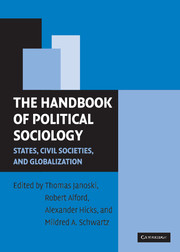Book contents
- Frontmatter
- Contents
- Preface
- Contributors
- Political Sociology in the New Millenium
- PART I THEORIES OF POLITICAL SOCIOLOGY
- 1 Rulemaking, Rulebreaking, and Power
- 2 Neopluralism and Neofunctionalism in Political Sociology
- 3 Conflict Theories in Political Sociology
- 4 Institutionalist and State-Centric Theories of Political Sociology
- 5 Culture, Knowledge, and Politics
- 6 Feminist Theorizing and Feminisms in Political Sociology
- 7 The Linguistic Turn: Foucault, Laclau, Mouffe, and Žižek
- 8 Rational-Choice Theories in Political Sociology
- 9 Theories of Race and the State
- PART II CIVIL SOCIETY: THE ROOTS AND PROCESSES OF POLITICAL ACTION
- PART III THE STATE AND ITS MANIFESTATIONS
- PART IV STATE POLICY AND INNOVATIONS
- PART V GLOBALIZATION AND POLITICAL SOCIOLOGY
- References
- Name Index
- Subject Index
6 - Feminist Theorizing and Feminisms in Political Sociology
Published online by Cambridge University Press: 05 June 2012
- Frontmatter
- Contents
- Preface
- Contributors
- Political Sociology in the New Millenium
- PART I THEORIES OF POLITICAL SOCIOLOGY
- 1 Rulemaking, Rulebreaking, and Power
- 2 Neopluralism and Neofunctionalism in Political Sociology
- 3 Conflict Theories in Political Sociology
- 4 Institutionalist and State-Centric Theories of Political Sociology
- 5 Culture, Knowledge, and Politics
- 6 Feminist Theorizing and Feminisms in Political Sociology
- 7 The Linguistic Turn: Foucault, Laclau, Mouffe, and Žižek
- 8 Rational-Choice Theories in Political Sociology
- 9 Theories of Race and the State
- PART II CIVIL SOCIETY: THE ROOTS AND PROCESSES OF POLITICAL ACTION
- PART III THE STATE AND ITS MANIFESTATIONS
- PART IV STATE POLICY AND INNOVATIONS
- PART V GLOBALIZATION AND POLITICAL SOCIOLOGY
- References
- Name Index
- Subject Index
Summary
Feminist theorizing in the social sciences covers a vast territory. It emerged from feminist movements and feminisms in politics, and though still in dialogue with them, feminist theory now has its own track in the academy, in academic journals, graduate programs, and has its canon of core feminist texts. Feminist theory has been engaged in debates with mainstream theory, including critiques of theories, concepts, and epistemologies as well as offered alternative explanatory theories of gender differences in power resulting from economic, political, and social structures and processes (Chaftez, 1997). It has a normative side developing models and formulating strategies to achieve gender equality and equity. However, as a result of postmodernism, in feminist theorizing there has been a strong critique of approaches that assume gendered coherent identities and interests. What has remained constant in feminist theorizing is its interdisciplinarity. In the course of this chapter, we will be traveling across disciplinary borders, featuring feminists speaking from traditions of sociology, political science and political philosophy, history and law. My presentation of this kaleidoscopic and fractured theoretical terrain is admittedly selective, based on my own rendering of the core research areas, the key actors, and their exchanges.
The chapter focuses on gender, state, and citizenship using two lenses. The first concentrates on debates among feminist theorists and citizenship around public and private spheres, difference, and universalism; the second turns to feminist theorists in dialogue with mainstream theorizing on citizenship.
- Type
- Chapter
- Information
- The Handbook of Political SociologyStates, Civil Societies, and Globalization, pp. 135 - 152Publisher: Cambridge University PressPrint publication year: 2003



